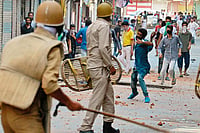The 15 stories in this volume, from Assamese to Urdu, are-to put it crudely-about the relationship between the sexes. But this is a complete inversion of the genre of the love story, or of the accepted tenets of the emotion itself. The book details men and women-mostly the latter-trying to come to terms with the complexity of relationships, individuals grappling with the violence inherent in negotiations between the self and the discourses of 'love'. There's no exultation here, no prettified sentiment, but a look at love's slimy underbelly, a visit to the stinking sewers beneath the edifice. The book is permeated with the nausea of death and bodily secretions, savage pain and brooding violence, desperate longing and loneliness.
This review's not meant to be forbidding, on the contrary, the stories are great, the translations eminently readable; with perhaps a few exceptions. The Kashmiri story A New Triangle suffers from too literal a translation, flattening the reading. But there're gems too. Manjula Padmanabhan's Stains, the only English story-(has English then, finally been accepted as part of the pantheon of Indian languages?)-deals with a sort of reverse miscegenation: a black woman coming to terms with her race, body, and difference from an Indian; posing questions of culture and identity in times of diasporic love. Goswami's The Empty Chest (Assamese) is shot through with the stench of burning flesh, of deceit, guilt and longing amidst inhuman deprivation.
But the ones that really stand out are The Question by U.R. Ananthamurthy and Ismat Chughtai's Housewife. The former is superb in its evocation of the question whether love finds fulfillment in a traditional-familial duty based emotion or in a contrapuntal surrender to sensuousness. Chughtai is inimitable in her interplay of unfettered desire with the appropriation of a woman's body through the institution of marriage; between the veneer of respectability and salacious pleasure; an ability to limn sexual tensions not at all blemished by the vein of mocking humour.
There are no reflections of a 'normally' accepted notion of love here; instead, the collection problematises 'normality' itself. Is there a universal understanding of love as denoting hapiness, joy and lasting bliss? Or is that a juvenile viewpoint glossing over the darker side of the human psyche, trying to cover the ruptures that infest human understanding? Kakar brings his psychoanalytical moorings to bear on the selection of these stories. Stories that seek to underscore that desire is not just an innocent state of grace; that states of being popularly considered antithetical to 'love' exist, not just as counterpoints, but as concomitant, even essential parts of that idealised emotion; that morbidity is engendered in human yearnings and passions.
Well, ever since translations led to the 'discovery' of literatures in Indian languages, there has been a satisfying decline in the number of anthologies with a panoramic 'Indian' in their titles comprising entirely of English pieces. This new-found 'love' means, perhaps, more books like this. Good! Buy, read, and do not lend.























